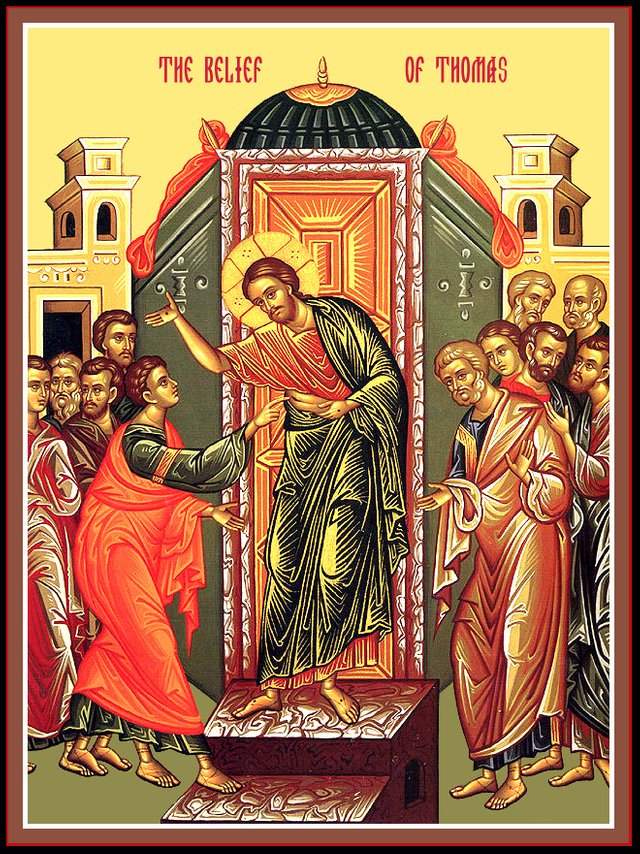Antipascha
lkisaid thoughts, sounds and creative miscellany episode 138
Lord I Call Tone 1 Byzantine
mp3: https://orthodoxtwopartmusic.org/files/Byz-t1-lic.MP3
sheet music: https://orthodoxtwopartmusic.org/files/LIC-t1-byz.pdf
Saint Thomas Sunday: Antipascha
The Sunday after Easter, called the Second Sunday, is thus the eighth day of the paschal celebration, the last day of Bright Week. It is therefore called the Antipascha, and it was only on this day in the early church that the newly-baptized Christians removed their robes and entered once again into the life of this world.
In the Church services the stress is on the Apostle Thomas’ vision of Christ and the significance of the day comes to us in the words of the gospel:
Then He said to Thomas, “Put your finger here, and see My hands; and put out your hand, and place it in My side; do not be faithless, but believing.” Thomas answered Him, “My Lord and my God!” Jesus said to him, “Have you believed because you have seen Me? Blessed are those who have not seen and yet believe” (Jn 20.27–29).
We have not seen Christ with our physical eyes nor touched His risen body with our physical hands, yet in the Holy Spirit we have seen and touched and tasted the Word of Life (1 Jn 1.1–4), and so we believe.
At each of the daily services until Ascension Day we sing the Easter Troparion. At each of the Sunday services beginning with Antipascha, we sing the Easter canon and hymns, and repeat the celebration of the “first day of the week” on which Christ rose from the dead. At all of the liturgies the epistle readings are taken from the Book of Acts telling us of the first Christians who lived in communion with the Risen Lord. All of the gospel readings are taken from the Gospel of Saint John, considered by many to be a gospel written particularly for those who are newly-baptized into the new life of the Kingdom of God through death and new birth in Christ, in the name of the Holy Trinity. The reason for this opinion is that all of the “signs”—as the miracles in Saint John’s Gospel are called—deal with sacramental themes involving water: wine and bread. Thus, each of the Sundays after Thomas Sunday with the exception of the third, is dedicated to the memory of one of these “signs.”
https://oca.org/orthodoxy/the-orthodox-faith/worship/the-church-year/post-easter-sundays
Before Reading the Holy Scripture
Illumine our hearts, O Master Who lovest mankind, with the pure light of Thy divine knowledge. Open the eyes of our mind to the understanding of Thy gospel teachings. Implant also in us the fear of Thy blessed commandments, that trampling down all carnal desires, we may enter upon a spiritual manner of living, both thinking and doing such things as are well-pleasing unto Thee. For Thou art the illumination of our souls and bodies, O Christ our God, and unto Thee we ascribe glory, together with Thy Father, Who is from everlasting, and Thine all-holy, good, and life-creating Spirit, now and ever and unto the ages of ages, Amen.
scripture readings: https://oca.org/readings/daily/2019/05/05
Matthew 28:16-20
Acts 5:12-20
John 20:19-31
Resurrection Troparion Tone 1
mp3: https://orthodoxtwopartmusic.org/files/Byz-res-t1.MP3
sheet music: https://orthodoxtwopartmusic.org/files/Res-t1-trop-byz.pdf
Become a supporter of this podcast:
https://anchor.fm/lkisaid/support
Posted from my blog with SteemPress : https://cuppa.love/antipascha/

Hi! I am a robot. I just upvoted you! I found similar content that readers might be interested in:
https://oca.org/orthodoxy/the-orthodox-faith/worship/the-church-year/post-easter-sundays